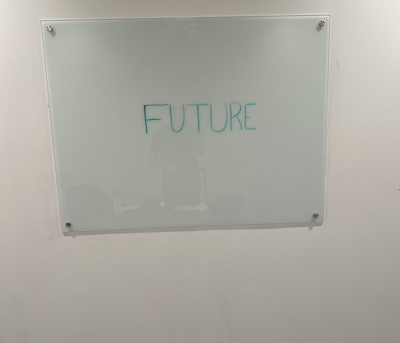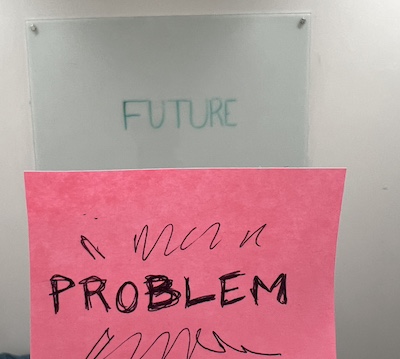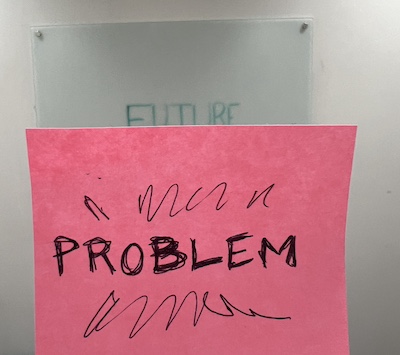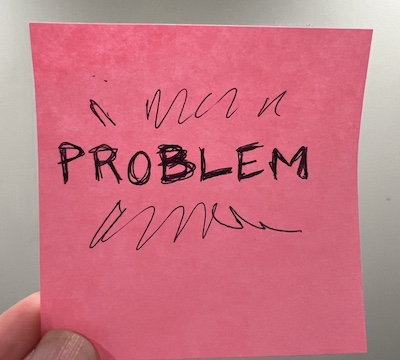How not to give up (and how to give up on purpose)
In any long project, you’re bound to hit psychological pits—those points where things seem so bleak that you question whether you should even keep going.
There will be days when you feel like giving up. Not because the data tells you it’s time to stop, but because something has just dragged you down into a kind of despair.
How do you persevere during these times, instead of giving up?
How situational problems turn into existential crises
Starting off on a new venture is exciting. Beginnings sparkle with inspiration. Early days feel so productive, with plans finally turning into action. The future is clear and bright.

At some point, though, a problem arises.

If you haven’t sufficiently prepared yourself for this problem, it may start to seem a lot bigger than it really is.

In fact, it may seem so big that you lose sight of your initial goals. The future you envisioned becomes impossible to see.
When that happens, even small, easily solvable, temporary, situational problems can seem like existential crises. The way a small piece of paper right in front of your face can obscure your view of everything else.
This situation can disorient you to the point that you forget you’re dealing with a specific problem, and instead you start to question whether the future you had envisioned at the start is even possible. Or worth the effort.
Or… was there even ever a future vision? Was it all just magical thinking from the start?

Persevering through crisis begins well before the crisis
I’ve felt these feelings when writing some of my novels and while building Gray Bear Coaching. I’ve watched otherwise rational colleagues fall prey to these feelings. Many of my clients have expressed these feelings as well.
While it is possible to simply power through a crisis through sheer effort and willpower, I’ve found over the years that three simple exercises when you’re in that early excitement phase can set you up for getting through these psychological pits faster and easier.
1. Define your north star
Describe your “why” for whatever you’re doing. Not just in platitudes, but in profoundly real and honest terms. This is the “north star” that will guide you through those dark periods.
When I first started writing novels back in the early 2000s, I had a vague ideal of what “successful author” looked like. Six-figure advances. Interviews on NPR. Long lines of fans waiting for me to sign their copy of my book.
So, when, in the hard dark period of doing the truly difficult work of actually writing a novel, I realized most of that vision was a magical fantasy (advances are closer to $10k than $100k, and just 2% of traditionally published books sell more than 5,000 copies), I fell into a psychological pit. It was hard to climb back out and start writing again.
When I started Gray Bear Coaching, however, I knew to establish my “why” right up front. I want to help people. I want to earn a sustainable living. I want to feel I am contributing something valuable. I want to engage my creative nature. I want to learn and grow. I want a flexible lifestyle.
The reasons I made this career change, started my own business, and created my own brand make up my north star. They are my guide through those dark periods.
Reconnecting to the reason I started all this in the first place brings back that original feeling of excitement and inspiration, making it easier to persevere.
2. What are your go/no-go points and your quit criteria?
Not all ventures deserve to succeed. Not all projects should be completed. But how do you know when it’s actually time to quit?
If you don’t know how to decide when it’s time to quit, then you don’t know how to decide when you should keep going. You may end up in a state of constant ambivalence and uncertainty. And that is a terrible place to live.
To avoid this, identify several key go/no-go points early on, and the criteria you’ll use to determine if you’re still on track. Then revisit them regularly and adjust them as necessary.
When I started Gray Bear Coaching, I imagined a three-year timeline. I really didn’t know what to expect or what obstacles I’d face, but I could predict how I would feel if I had or hadn’t achieved certain metrics by certain times.
Three years is not a magic number. I chose it because it fit my personal financial situation, my tolerance for risk, and my desire for stability.
I’ve adjusted my timeline a few times in the last year, but I’ve found more often than not that when I fall into a psychological pit, I can return to it and realize hey, I’m actually still pretty much on track.
3. Give yourself tools to get wider perspective
A single problem can begin to loom so large that it fills your entire vision. It becomes the only thing you can see.

Some people get so focused on their ultimate goal that it’s like they’re looking at it through a telescope… and every little problem that comes up is like a fly landing on their telescope lens.
If you can’t pull yourself back from the telescope, all you’ll be able to see is that fly’s butt. Even worse, you may not even realize it’s just a fly that you can shoo away. That’s how little problems seem to be all-consuming existential crises.
I have seen this in real life. (Not literally, of course. The telescope and fly are metaphorical.)
I’ve had clients so locked in on a singular, faraway goal that a very small problem has paralyzed them, or thrown them into a panic. They couldn’t function rationally because they’d lost all perspective. They couldn’t see past that one little problem until I helped them return to their bigger picture.
It’s important to keep people around who will help you keep proper perspective. Whether that’s a partner, a friend, a personal board of directors, a professional coach, or someone else, being able to have a disinterested yet knowledgeable party to check you when you’re reeling can make all the difference.
I can help
Looking to be a better leader? Contemplating a career change? Struggling with a big life question? Want to write or publish a book? Thinking about retirement?
I can help. Hit me up for a free coaching session now.



2 Comments
Create your lifeline to the future - Gray Bear Coaching LLC · December 3, 2024 at 9:41 am
[…] had become almost incapable of thinking about a time when these problems would all be behind her. The problems loomed so large that she couldn’t envision any kind of future […]
Knowing when it’s time to stop - Gray Bear Coaching LLC · July 7, 2025 at 12:17 pm
[…] written before about action planning and quit criteria, but today I’m thinking about the feeling of being done. Not about achieving goals or meeting […]